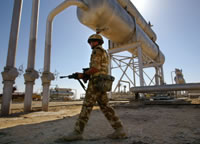Crude oil prices reached a record high on August, on a mix of supply constraints and fears of terrorism. It appears that high prices will remain for quite some time
After oil prices fell to about $9-a-barrel in 1998, the Organization of the Petroleum Exporting Countries (OPEC) showed remarkable discipline, restraining production and managing supplies to get oil back above a $22-a-barrel floor and keep it there. But OPEC' s policy is in disarray today, as the cartel' s 11 members seem unable to stick to the other half of their self-imposed bargain by keeping their benchmark price under a $28-a-barrel ceiling. Low-sulfur crude for delivery next month, the most widely watched oil price, settled at $46.58-a-barrel in New York on Friday, August 13th, the third time that it has set a record.
The benchmark basket price that OPEC uses is typically several dollars lower, because it also includes less - sought - after grades with more sulfur content; on Thursday, August 12th, it reached $40.76-a-barrel, 41% higher that a year earlier. There is not much that even OPEC` s largest producer, Saudi Arabia, can do. The Saudi oil minister, Ali al-Naimi, tried on August 11th to reassure the markets that there was plenty of oil available, announcing that the kingdom had increased production by 1 million barrels a day over the last three months, to 9.3 million barrels a day, and that it could quickly pump another 1.3 million barrels daily if needed.
Traders shrugged off the announcement and bid prices up further. "To me that was a pretty bullish sign from the market", said Thomas Bentz, senior oil analyst with BNP Paribas in New York. "Everyone knows OPEC' s reached full capacity". After the downfall of Saddam Hussein in Iraq, OPEC ministers were concerned that a rapid return of Iraqi oil to the market would bring prices down. That was before sabotage and the continuing insurrection against the United States-led occupation of the country caused the shutting off of Iraq' s oil export pipeline through Turkey and hampered the rehabilitation of its oil industry. The last thing the cartel wanted to do after the invasion of Iraq was to put too much oil on the market. OPEC ministers remembered the last time that happened, in November 1997, when they decided at a meeting in Jakarta to raise their production ceiling by 10%. The timing of that move was especially unfortunate, as Asia was entering an economic crisis and a new United Nations program was allowing Iraq to resume exports. By the end of 1998, OPEC' s benchmark price was down to $9.13, its lowest since 1986.
Determined not to repeat that experience, OPEC lowered its overall production ceiling three times in the months after the collapse of Hussein' s regime last year, by a total of 3.9 million barrels-a-day. Not until June of this year did OPEC finally decide to reverse course, agreeing at its Beirut meeting to raise its production ceiling to 26 million barrels-a-day. OPEC has met twice since then and canceled a third gathering without taking any new measures; it is next scheduled to meet on September 15th in Vienna. "OPEC' s being worried about a repeat of Jakarta", said Jay Saunders, an analyst with Deutsche Bank in New York. "It wants to be more conservative and cautious, rather than put too much oil on the market".
Another problem is that things are not going smoothly in Iraq. Attacks against the country' s oil infrastructure continue and have limited the ability of the Iraqi Oil Ministry and foreign contractors to spark an Iraqi oil renaissance. Until the country` s security situation is resolved, the world should not expect much more production out of Iraq that the 1.7 million bpd of exports it is getting. No non-OPEC producer will be coming to the rescue either. All have been in maximum production mode for more than a year, restricting output only for purposes of field maintenance and equipment upgrades. Bringing new fields online, whether in OPEC or non-OPEC states, normally takes at least a year.
But even with supplies high, prices of more than $40 a-barrel are abnormally high. The problem is two-fold. First, the constant steam of terrorism warnings for locations such as Saudi Arabia and New York City has the markets on edge, adding some $5 to $8 to the cost of every barrel. As long as terrorism is on people' s minds, this premium will continue to figure strongly in global markets. The most dramatic threat would be a potential attack against Saudi facilities, in particular the Ras Turana loading platform on the Persian Gulf. Though al Qaeda has little desire to sabotage Saudi production, it has every interest in driving Westerners out of the kingdom. Those Westerners are the brains behind the Saudi oil complex and they would be responsible for both restarting mothballed production and exploiting new fields in the future.
In Russia, closing the book of Yukos' s leadership could end a 13-month legal saga, but the political nature of the case will not attract Western energy firms to Russia quickly or in numbers.
Since supply is not going to give the markets a break anytime soon, the question becomes: When will demand crack? The end of the Northern Hemisphere' s summer is about a month away, meaning the world` s biggest oil consumers will be moving into a period o lower consumption, which will partially offset all the bad news that is currently roiling the markets. This will not lead to a price crash, but it should lower the price a few dollars on those rare weeks that terrorist threats are not flying fast and furious.
That means that prices are likely to remain where they have been for the past six months: averaging around $38-a-barrel. At such level, many countries cannot handle the additional cost; regional recessions - particularly Asian recessions - have been caused by prices that were significantly lower. The one saving grace for primarily Asian countries is the relatively weak US dollar; all oil contracts are processed in dollars. As the dollar rises - there is ample evidence that the post-Sept. 11 fall is at an end - large swathes of the global economy can look forward to rising energy prices, and the inflation and recessions that normally go with them.





 By: N. Peter Kramer
By: N. Peter Kramer
